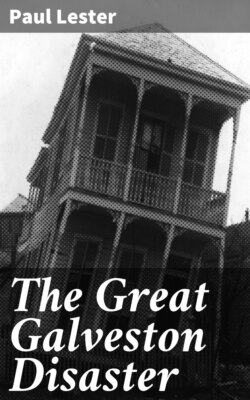Читать книгу The Great Galveston Disaster - Paul Lester - Страница 20
На сайте Литреса книга снята с продажи.
CITY TURNED INTO A RAGING SEA.
ОглавлениеTable of Contents
“The wreck of Galveston was brought about by a tempest so terrible that no words can adequately describe its intensity, and by a flood which turned the city into a raging sea. The Weather Bureau records show that the wind attained a velocity of eighty-four miles an hour when the measuring instrument blew away, so it is impossible to tell what was the maximum.
“The storm began at 2 o’clock Saturday morning. Previous to that a great storm had been raging in the Gulf, and the tide was very high. The wind at first came from the north, and was in direct opposition to the force from the Gulf. Where the storm in the Gulf piled the water up on the beach side of the city, the north wind piled the water from the bay onto the bay part of the city.
“About noon it became evident that the city was going to be visited with disaster. Hundreds of residences along the beach front were hurriedly abandoned, the families fleeing to dwellings in higher portions of the city. Every home was opened to the refugees, black or white. The winds were rising constantly, and it rained in torrents. The wind was so fierce that the rain cut like a knife.
“By 3 o’clock the waters of the Gulf and bay met, and by dark the entire city was submerged. The flooding of the electric light plant and the gas plants left the city in darkness. To go upon the streets was to court death. The wind was then at cyclonic velocity, roofs, cisterns, portions of buildings, telegraph poles and walls were falling, and the noise of the wind and the crashing of buildings were terrifying in the extreme. The wind and waters rose steadily from dark until 1.45 o’clock Sunday morning. During all this time the people of Galveston were like rats in a trap. The highest portion of the city was four to five feet under water, while in the great majority of cases the streets were submerged to a depth of ten feet. To leave a house was to drown. To remain was to court death in the wreckage.
“Such a night of agony has seldom been equaled. Without apparent reason the waters suddenly began to subside at 1.45 A. M. Within twenty minutes they had gone down two feet, and before daylight the streets were practically freed of the flood-waters. In the meantime the wind had veered to the southeast.
